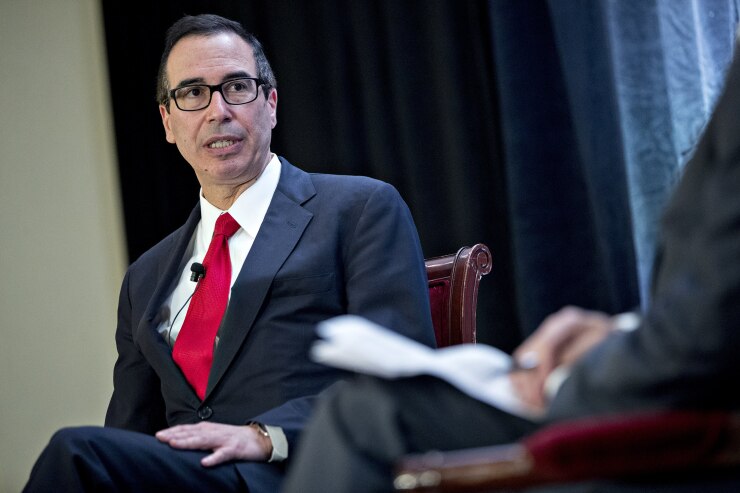Treasury Secretary Steven Mnuchin said he supports extending the 2019 tax-filing deadline beyond April 15 to provide relief from economic disruption caused by the coronavirus outbreak, and he’ll recommend that step to President Donald Trump.
Speaking on Capitol Hill Wednesday, Mnuchin said the delay would be a “good stimulus” for small businesses and individuals affected by the economic fallout from the global health crisis.
“We think we can provide over $200 billion of liquidity into the economy by delaying certain tax payments,” Mnuchin said at a House Appropriations Committee hearing.

Treasury officials have been discussing the idea of extending the Internal Revenue Service’s payment deadline as the Trump administration considers measures to relieve economic pressure on citizens, businesses and government agencies dealing with the impact of the virus.
Mnuchin said his department can delay the payments without permission from Congress. The delayed tax payment idea is part of discussions exploring how the Treasury Department can independently address the economic consequences of the virus. Mnuchin also held discussions with House Speaker Nancy Pelosi on Wednesday about an economic stimulus package.
Mnuchin said he is looking for ways to fund the tax deadline extension.
A Treasury spokeswoman said no decision has been made. Spokespeople for the IRS and White House didn’t immediately respond to requests for comment.
Deadline extension
The virus outbreak in the U.S. has prompted localized school closings, interrupted supply chains and forced businesses and government agencies to consider having employees work from home.
The April 15 deadline is outlined in the tax code, though it includes exceptions for when the 15th falls on a local holiday or weekend. It also gives the Treasury secretary latitude to delay the deadline in disaster situations.
The IRS also routinely extends the deadline for victims of natural disasters. For example, the agency granted victims of recent tornadoes in Tennessee until July 15 to file. In 2018, the IRS delayed the due date by a day when the computer system crashed on the filing deadline and taxpayers were unable to submit their returns.
“Depending on the circumstances, the IRS may grant additional time to file returns and pay taxes,” the agency says on its website. “Special tax law provisions may help taxpayers and businesses recover financially from the impact of a disaster, especially when the federal government declares their location to be a major disaster area.”
“The cleanest way to do this is for Congress to pass a law saying how long the delay would occur and what tax forms and tax liabilities are delayed,” said Nicole Kaeding, an economist with the National Taxpayers Union Foundation. “Assuming Congress does not do that, the Treasury secretary has broad authority.”
Helping taxpayers
Taxpayers can already automatically request a six-month extension to file their returns, though that doesn’t postpone the deadline to pay any liability they may owe. That bill would continue to accrue interest and penalties until it is paid.
An extension of the April 15 filing deadline would give taxpayers more time to pay their tax bills without additional costs.
“I think it would help all taxpayers,” Senate Finance Chairman Chuck Grassley said Wednesday. “People don’t have to take advantage of it but if they want to, it’s all voluntary. And it’s something that can be done right now.”
Mnuchin also indicated that he may keep the U.S. Treasury bills issuance at a steady level to fund a possible extension to the April 15 tax deadline. Treasury bill issuance was set to fall in the second quarter as it historically does due to seasonal factors related to the April tax filing date. Issuance drops as tax season approaches because the federal government can rely on incoming tax revenue to support funding needs.
“We’re already working on funding that — that shouldn’t be an issue since we would have been downsizing our Treasury bills programs,” Mnuchin said Wednesday to reporters on Capitol Hill.
‘Complex considerations’
Some taxpayers are also facing a tax deadline just days away. Businesses organized as partnerships must file their returns by March 15. Many businesses and self-employed individuals also face a second April 15 deadline: they have to pay estimated quarterly taxes for this year, which could exacerbate cash-flow issues for businesses hard hit by a coronavirus-related downturn.
Delaying the federal deadline could create another problem, however, since most states also require returns be filed to their revenue departments by April 15.
“So while the simple idea of ‘move the date back and give taxpayers more time’ may seem good and easy, the issue is one with many complex considerations on exactly how to do it and how long to do it,” said Mark Steber, senior vice president and chief tax officer at Jackson Hewitt Tax Service Inc.
More than 59 million individual tax returns had been filed as of the last week in February, the most recent statistics the IRS has available. That’s approximately one-third of the tax returns the agency is anticipating to receive this year.
— Laura Davison and Saleha Mohsin, with assistance from Allyson Versprille and Kaustuv Basu





